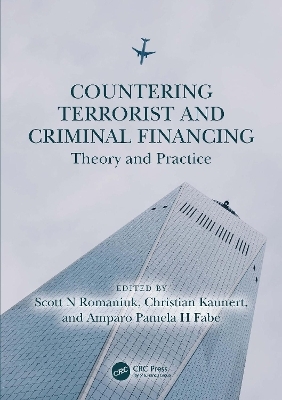
Countering Terrorist and Criminal Financing
CRC Press (Verlag)
978-1-032-36661-6 (ISBN)
Countering Terrorist and Criminal Financing provides an up-to-date overview and critical analysis of terrorism financing, focusing on tactics and practical measures directed at preventing money laundering and countering the flow of terrorism funding. In doing so, the book details some of the major doctrines, outlining policies of states and key regional and global partnerships in Europe, Asia, North America, South America, the Middle East, and Africa.
Chapters bring together a diverse range of expert scholars and practitioners who specialise in theoretical principles, utilising empirical research and an analysis of the cross-national networks and cross-group collaborations that underpin the illicit activities that fund such groups. The book serves as the most current and comprehensive resource in the area of countering the financing of terrorism and organised crime—incorporating regional and group-specific approaches, challenges, and consequences. This focus encompasses legal measures, social policies, and military operations and security force responses by states and non-state actors to assemble the most up-to-date counter-terrorist financing information into a single volume.
Dr Scott N Romaniuk is a Postdoctoral Research Fellow in Security Studies at the China Institute, University of Alberta. He received his PhD in International Studies from the University of Trento, examining the effects of Hungary’s counter-terrorism and security policies on civil society organizations in the post-9/11 period. He holds an MRes in Political Research, an MA in Terrorism, Crime and Global Security, and an MA in Military Studies (Joint Warfare). His teaching and research specializations include International Relations, Military and Strategic Studies, Security Studies, Terrorism and Political Violence, and Research Methods. He is a Senior Research Affiliate with the Canadian Network for Research on Terrorism, Security and Society (TSAS) and a member of the Conflict, Terrorism and Development (CTD) Collaboratory at Michigan State University. Prof Dr Christian Kaunert is Chair of Policing and Security, as well as Director of the International Centre for Policing and Security at the University of South Wales. He is also the Leader of the Cognate Research Group on Policing and Security at the University of South Wales. Previously, he served as an Academic Director and Professor at the Institute for European Studies, Vrije Universiteit Brussel, a Professor of International Politics, Head of Discipline in Politics, and the Director of the European Institute for Security and Justice, a Jean Monnet Centre for Excellence, at the University of Dundee. He was previously Senior Lecturer at the University of Dundee, Marie Curie Senior Research Fellow at the European University Institute Florence, and Senior Lecturer in EU Politics and International Relations, University of Salford. He has been awarded with a prestigious Jean Monnet Chair in EU Justice and Home Affairs Policy and EU Counter-Terrorism (2012, 2013, 2017 and 2018), and received a prestigious Marie Curie Career Integration Grant (from 2012-2016), the latter held at the University of Dundee. He is currently the Editor of the Journal of Contemporary European Studies, International Conflict and Cooperation, and the Edward Elgar Book Series ‘European Security and Justice Critiques’. Prof Kaunert holds a PhD in International Politics and an MSc in European Politics from the University of Wales Aberystwyth, a BA (Hons) European Business from Dublin City University, ESB Reutlingen and a BA (Hons) Open University. Amparo Pamela Fabe is a Filipino Professor of Financial Terrorism and Transnational Organized Crime at the Philippine Public Safety College and the National Police College. Professor Fabe helped write Republic Act 11479, known as the Philippine’s Anti-Terrorism Act of 2020, particularly the section on penalizing the material support for terrorism. She is a Visiting Fellow at the International Center for Policing and Security at the University of South Wales, and a Fellow of the Daniel K. Inouye Asia-Pacific Center for Security Studies. She completed the WayOut Certification Training for the European Union Integrated Exit Program for Prison and Probation Program of the University of Toulouse Jean-Jaureas and the Postgraduate Program in Hate Crime/Hate Speech at the United Nations Interregional Crime and Justice Center, Rome, Italy. Professor Fabe is the Philippine National Police Representative to the Secretariat and to the ASEAN Senior Officials’ Meeting on Transnational Crime (SOMTC). She is a Preventing/Countering Violent Extremism specialist of the Armed Forces of the Philippines. Fabe is a member of the United Nations Cryptocurrencies Working Group for Southeast Asia and a member of the United Nations Office of Drugs and Crime Contact Group on Sulu and Celebes Sea. Her affiliations include the American Chamber Overseas Security Advisory Council (East Asia and the Pacific), and the International Corrections and Prison Association.
Introduction: Challenges and Opportunities in Countering Terrorist Financing PART I – Critical Issues in Countering Terrorist and Criminal Financing 1. Actors and Agents in Countering Terrorist and Criminal Financing: A Critical Assessment 2. Anti-Money Laundering and Countering Terrorist Financing from an IR, Criminology, and Compliance Perspective: A Theoretical Marriage of Convenience 3. The FATF Recommendations and the Development of International Standards on Terrorist Financing 4. Civil Society Organisations and the Framing of United Nations Counter-Terrorism Financing Regulations 5. Revisiting a Marriage of Convenience: Anti-Money Laundering and Countering the Financing of Terrorism 6. Banks, Bucks, and Bombs: Financial Institutions' Efforts to Combat Money Laundering and Terrorist Financing 7. Deadly Aid: Charities, Non-Profit Organisations, and the Financing of Terrorism 8. Social Media and Terrorist Financing 9. Social Media Intelligence to Combat Extremist and Terrorist Support: Can an Orthodox Focus on Unlawful Groups Survive in the Era of QAnon, Anti-vax Conspiracy Belief, and Stop the Steal? 10. Drug Trafficking and Terrorism Financing: A Transnational Synthesis 11. White-Collar Crime and Terrorism: Examining the Links and Challenges 12. Funding Terrorist Groups through Kidnap for Ransom 13. Human Capital: Boko Haram’s Exploitation of Women to Support and Finance Its Criminal Operations 14. "Destruction Does Not Make Money, But Looking Does": Illicit Antiquities, Terrorism, and the Financing of ISIS 15. Financing Terror: Trade in Counterfeit Products 16. The Limits of the Law and Legal Frameworks for Preventing and Countering the Flow of Terrorist Funds 17. Cyber Dimensions of Terrorism Financing 18. New Dimensions of Terrorism Financing: Evaluating Risks, Types, and Precautions PART II – State and Group Cases in Countering Terrorism Financing: North, Central, and South America 19. Some Past Successes, Yet Many Remaining Challenges: The United States and the War on Terrorist Financing 20. Chasing "Dirty Money": Canada’s Efforts to Disrupt Money Laundering in the Casinos, Real Estate and Horse-Racing Sectors 21. Countering Terrorist Financing in the Caribbean 22. Assessing Efforts to Disrupt and Manage Criminal and Terrorist Financing in South America 23. Brazil’s Commitment to Fighting Money Laundering and Terrorist Financing: An Analysis of its Financial Activities Control Council and National Strategy to Fight Corruption and Money Laundering 24. State Intelligence or Stash Intelligence?: Tracing Terrorism Financing in Colombia after FARC-EP Demobilisation PART III: State and Group Cases in Countering Terrorism Financing – Europe 25. EU Measures to Combat Terrorist Financing 26. Creating an EU "Homeland Security": Examining the Potential of EBCGA and EPPO Co-Operations in Countering Terrorist and Criminal Financing 27. Creating Captain Europe: The Contribution of Academia in the Creation and Training of New European Border and Coast Guards 28. Counter-Terrorism Financing Activities Introduced by the Council of Europe and the Organisation for Security and Cooperation in Europe 29. A Wicked Problem: UK Anti-Money Laundering and Counter-Terrorist Financing Measures 30. Examining the Efficacy of France’s Counter-Terrorist Financing Approaches 31. Counter-Terrorism Financing Initiatives Utilised by the Russian Federation PART IV: State and Group Cases in Countering Terrorism Financing - The Middle East and Africa 32. Post-Arab Spring Counter-Terrorist Financing Policies: An Appraisal of Policies and Protocols Used in the MENA Region 33. Cutting Terrorist Monetary Flows and Money Laundering in Tunisia 34. Legal and Institutional Frameworks for Counter-Terrorism Financing Policy in Algeria 35. Morocco’s Efforts Against Terrorism Financing 36. Oil for Terror: The Sources of Income of the Islamic State 37. Combatting the Financing of Terrorism in Saudi Arabia: Legal Reforms and Future Challenges 38. Egypt’s Fight against Terrorist Funding 39. Countering Terrorism Financing in Turkey: Opportunities and Challenges Ahead 40. Countering Terrorist Financing: Turkey’s Economic Battle against the Kurdistan Workers' Party (PKK) 41. Al-Shabaab Financing: Sources, Methods, and Countering Terrorist Financing PART V: State and Group Cases in Countering Terrorism Financing - Asia and the Asia-Pacific Regions 42. Fake Indian Currency Notes: Counterfeit Currency, Criminal Cartel, and Terror Financing in India and South Asia 43. The Roles of Central Asian States in (Anti-)Money Laundering and (Countering-)Terrorist Financing 44. A Critical Assessment of Pakistani Counter-Terrorism Financing Measures 45. Feeding the Criminal-Terror Nexus: The Role of Pakistan’s Unregulated Economy 46. Bangladesh’s Counter-Terror Financing Measures - the Sheikh Hasina Regime 47. Hawala and Terror Financing in the Indian Subcontinent 48. Countering Terrorist Financing in Southeast Asia: The Role of ASEAN 49. Birds of a Feather Fight Terror Together: How ASEAN Countries Tackle Anti-Money Laundering and Combatting the Financing of Terrorism Challenges 50. Countering Terrorist Financing in Indonesia 51. The Tree of Violence: Exposing the Root Dynamics of Terrorism Financing beneath the Marawi Siege 52. Method to the Madness: When Terrorism Exploits Human Trafficking, Drug Smuggling, and Weapons Smuggling for Financial Purposes 53. Australia’s Post-9/11 Anti-Terrorism Policies and Approaches
| Erscheinungsdatum | 11.11.2023 |
|---|---|
| Zusatzinfo | 15 Tables, black and white; 10 Line drawings, black and white; 5 Halftones, black and white; 15 Illustrations, black and white |
| Verlagsort | London |
| Sprache | englisch |
| Maße | 178 x 254 mm |
| Gewicht | 1580 g |
| Themenwelt | Recht / Steuern ► Allgemeines / Lexika |
| Recht / Steuern ► EU / Internationales Recht | |
| Recht / Steuern ► Strafrecht ► Kriminologie | |
| Sozialwissenschaften ► Politik / Verwaltung | |
| ISBN-10 | 1-032-36661-3 / 1032366613 |
| ISBN-13 | 978-1-032-36661-6 / 9781032366616 |
| Zustand | Neuware |
| Haben Sie eine Frage zum Produkt? |
aus dem Bereich


